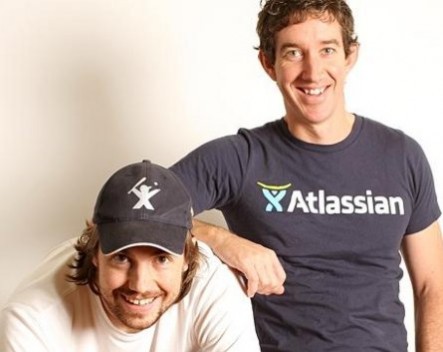
Atlassian’s $US150 million ($A159m) share sale announced yesterday has rocketed co-founders Scott Farquhar and Mike Cannon-Brookes into Australia’s billionaire rankings.
Farquhar talked to SmartCompany from Los Angeles last night as news broke of the deal which values Atlassian at $US3.3 billion.
Farquhar and Cannon-Brookes are each believed to own close to 40% of the share capital and neither is selling down their stake as part of this sale, which leaves them with paper wealth of $1.4 billion each.
Farquhar says the deal was brokered by “inviting bids from a small number of select parties” and will assist Atlassian’s future growth through an injection of both capital and expertise.
“We have always been about thinking long term so the investors we get on board, like Accel Partners, help us set up the company for the next stage of growth,” he says.
“As we head towards an initial public offering we’ve now got one of the largest tech investors in the US on board and with their public market experience they will really help us set up.”
“It also allows our employees, some of whom have been around for 10 years to realise the value of their Atlassian stock.”
Farquhar would not be drawn on the timing of an IPO for Atlassian but it is “not in the next few months”.
The share sale is the latest move in a trajectory which has seen Atlassian soar to global prominence. In 2013, the business booked revenue of $US149 million up from $US111 million in 2012.
Farquhar says revenue is on track to be “north of” $US 200 million for this year. He attributes Atlassian’s success to “taking a long term view of everything we do”.
“At Atlassian, we want to be around in 50 years’ time,” he says.
Farquhar plans to grow the business further by expanding into multiple markets.
“As software development becomes an increasing part of every single business, our products actually become quite critical to every business,” he says. “That’s the area for growth of us.”
Atlassian plans to achieve this growth without hiring a single salesperson.
“We are not anti-sales; we are pro automation,” Farquhar says.
“We take an engineer’s philosophy to everything that we do. We are really about scaling the business.”
Although Farquhar concedes eventually Atlassian may have to follow a more traditional sales path if it wants to sell into large businesses at the top instead of going through the business’ developers.
“In the future we may have sales situations where we need to speak their language,” he says.
The biggest challenge at the moment for Atlassian is its stellar growth according to Farquhar.
The business has averaged 40% year on year growth for the last five years.
“We are growing fast. With that comes the inevitable issue of scaling, it sounds mundane but finding office space when you double in size every two years is hard.”
Atlassian’s move earlier this year to shift its domicile from Australia to the United Kingdom caused some soul searching in Australia’s tech scene but Farquhar insists Atlassian is still an Australian company “through and through”.
“We still collect all our revenue globally through Australia and the large number of people we are hiring are through Australia,” he says.
Farquhar says the move followed a global search to find the best place for Atlassian to be based “for the best interests of the company”.
Atlassian’s “back office people” analysed where Atlassian’s customers were, where the team wanted to live and settled on the United Kingdom.
“We looked at Singapore but the UK made sense because of the treaties between Australia and the UK it is easier and the global investor base is more used to investing in a UK company.”
But Farquhar does say the talent pool in Australia is limited.
“We don’t graduate enough computer science graduates from university,” he says. “That is the biggest constraint on our growth.”
“We have a unique company culture so we spend a lot of time on hiring for promotion and continuing that culture. I think half our staff have been here less than one year and four months.”
Atlassian has previously criticised the government for its approach to 457 visas for skilled employees and Farquhar says the program is essential because the Australian technology environment has more jobs than people to do them.
“Arrogance and lack of a strong industry in Australia meant we didn’t have mentors for a long time,” he says.
“Our argument with the government on these visas is that a lot of the people who could train us are highly qualified people we need to import from Silicon Valley.”
“Now we have mentors in our business and also on our board.”
This article first appeared on SmartCompany.


COMMENTS
SmartCompany is committed to hosting lively discussions. Help us keep the conversation useful, interesting and welcoming. We aim to publish comments quickly in the interest of promoting robust conversation, but we’re a small team and we deploy filters to protect against legal risk. Occasionally your comment may be held up while it is being reviewed, but we’re working as fast as we can to keep the conversation rolling.
The SmartCompany comment section is members-only content. Please subscribe to leave a comment.
The SmartCompany comment section is members-only content. Please login to leave a comment.